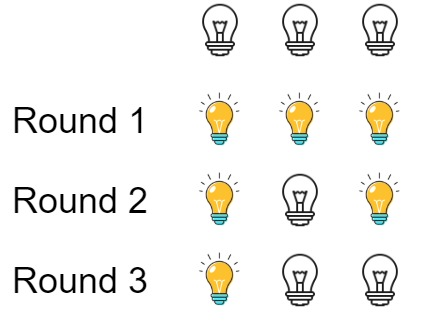319. Bulb Switcher
问题:
给定n个初始状态为off的灯,
- 第1次,按 1*i 号灯的开关。
- 第2次,按 2*i 号灯的开关。
- ...
- 第n次,按 n 号灯的开关。
求最后on的灯共有几个。
Example 1: Input: n = 3 Output: 1 Explanation: At first, the three bulbs are [off, off, off]. After the first round, the three bulbs are [on, on, on]. After the second round, the three bulbs are [on, off, on]. After the third round, the three bulbs are [on, off, off]. So you should return 1 because there is only one bulb is on. Example 2: Input: n = 0 Output: 0 Example 3: Input: n = 1 Output: 1 Constraints: 0 <= n <= 10^9

解法:math
根据题意:
我们观察:第n号灯,被按下开关的次数=
第 n的因数 轮。
ex:
- n=6:
- 第1,2,3,6轮
- n=9:
- 第1,3,9轮
这样有一个规律,
- 基本n的因数的个数都是成对的,如 1*6, 2*3, 1*9
- 除非n是一个平方数,使得其中一个因数^2=他自己,这个因数单独存在。如 3*3
对于开关的特性:
- 开奇次开关:最后灯是亮的。on
- 开偶次开关:最后灯是暗的。off
那么我们要求的就是,存在奇数个因数的灯的个数。
即n以内,有多少个平方数。
sqrt(n);
n的平方根是多少,那么从1~这个平方根,有多少个数,就存在多少个n以内的平方数。
代码参考:
1 class Solution { 2 public: 3 int bulbSwitch(int n) { 4 return (int)sqrt(n); 5 } 6 };





 浙公网安备 33010602011771号
浙公网安备 33010602011771号